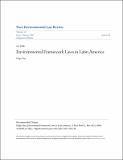| dc.description.abstract |
In the rapidly changing global marketplace, Latin American countries face increased pressures to prevent environmental pollution as they struggle to become more productive and competitive economically. As they pursue these dual objectives, environmental protection and economic development, they are challenged to find a strategy to coordinate their policies, programs and regulations so that they are compatible rather than conflicting. In recent years, an increasing number of Latin American countries have adopted a comprehensive framework of laws. These laws attempt to integrate a variety of regulatory programs and provide for coordinated implementation. This article examines the framework laws adopted by Brazil, Chile, Mexico, and Venezuela. A digest of each law explains the approach taken by each nation to achieve a more integrated strategy of environmental protection, while recognizing the importance of economic development. A brief analysis of the shared approaches taken by these governments follows the digests. That analysis evaluates the extent to which each country has considered the necessary variables that will enable it to achieve environmental protection under a single law. |

